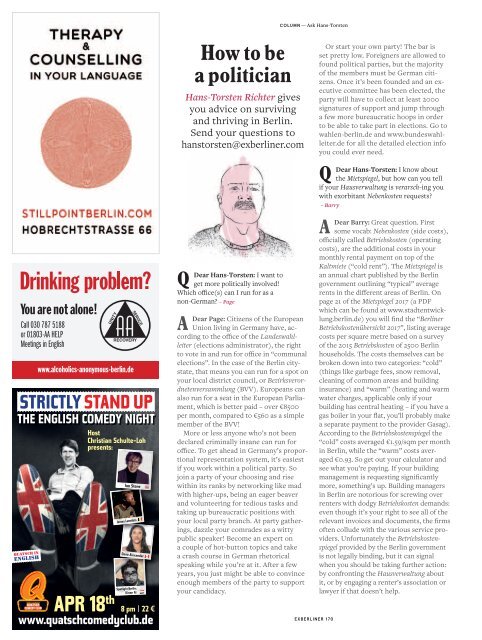EXBERLINER Issue 170, April 2018
Create successful ePaper yourself
Turn your PDF publications into a flip-book with our unique Google optimized e-Paper software.
COLUMN — Ask Hans-Torsten<br />
You are not alone!<br />
Call 030 787 5188<br />
or 01803-AA HELP<br />
Meetings in English<br />
www.alcoholics-anonymous-berlin.de<br />
Update.indd 1 06/10/16 13:01<br />
Q<br />
How to be<br />
a politician<br />
Hans-Torsten Richter gives<br />
you advice on surviving<br />
and thriving in Berlin.<br />
Send your questions to<br />
hanstorsten@exberliner.com<br />
Dear Hans-Torsten: I want to<br />
get more politically involved!<br />
Which office(s) can I run for as a<br />
non-German? – Page<br />
A<br />
Dear Page: Citizens of the European<br />
Union living in Germany have, according<br />
to the office of the Landeswahlleiter<br />
(elections administrator), the right<br />
to vote in and run for office in “communal<br />
elections”. In the case of the Berlin citystate,<br />
that means you can run for a spot on<br />
your local district council, or Bezirksverordnetenversammlung<br />
(BVV). Europeans can<br />
also run for a seat in the European Parliament,<br />
which is better paid – over €8500<br />
per month, compared to €560 as a simple<br />
member of the BVV!<br />
More or less anyone who’s not been<br />
declared criminally insane can run for<br />
office. To get ahead in Germany’s proportional<br />
representation system, it’s easiest<br />
if you work within a political party. So<br />
join a party of your choosing and rise<br />
within its ranks by networking like mad<br />
with higher-ups, being an eager beaver<br />
and volunteering for tedious tasks and<br />
taking up bureaucratic positions with<br />
your local party branch. At party gatherings,<br />
dazzle your comrades as a witty<br />
public speaker! Become an expert on<br />
a couple of hot-button topics and take<br />
a crash course in German rhetorical<br />
speaking while you’re at it. After a few<br />
years, you just might be able to convince<br />
enough members of the party to support<br />
your candidacy.<br />
Or start your own party! The bar is<br />
set pretty low. Foreigners are allowed to<br />
found political parties, but the majority<br />
of the members must be German citizens.<br />
Once it’s been founded and an executive<br />
committee has been elected, the<br />
party will have to collect at least 2000<br />
signatures of support and jump through<br />
a few more bureaucratic hoops in order<br />
to be able to take part in elections. Go to<br />
wahlen-berlin.de and www.bundeswahlleiter.de<br />
for all the detailed election info<br />
you could ever need.<br />
Q<br />
Dear Hans-Torsten: I know about<br />
the Mietspiegel, but how can you tell<br />
if your Hausverwaltung is verarsch-ing you<br />
with exorbitant Nebenkosten requests?<br />
– Barry<br />
A<br />
Dear Barry: Great question. First<br />
some vocab: Nebenkosten (side costs),<br />
officially called Betriebskosten (operating<br />
costs), are the additional costs in your<br />
monthly rental payment on top of the<br />
Kaltmiete (“cold rent”). The Mietspiegel is<br />
an annual chart published by the Berlin<br />
government outlining “typical” average<br />
rents in the different areas of Berlin. On<br />
page 21 of the Mietspiegel 2017 (a PDF<br />
which can be found at www.stadtentwicklung.berlin.de)<br />
you will find the “Berliner<br />
Betriebskostenübersicht 2017”, listing average<br />
costs per square metre based on a survey<br />
of the 2015 Betriebskosten of 2500 Berlin<br />
households. The costs themselves can be<br />
broken down into two categories: “cold”<br />
(things like garbage fees, snow removal,<br />
cleaning of common areas and building<br />
insurance) and “warm” (heating and warm<br />
water charges, applicable only if your<br />
building has central heating – if you have a<br />
gas boiler in your flat, you’ll probably make<br />
a separate payment to the provider Gasag).<br />
According to the Betriebskostenspiegel the<br />
“cold” costs averaged €1.59/sqm per month<br />
in Berlin, while the “warm” costs averaged<br />
€0.93. So get out your calculator and<br />
see what you’re paying. If your building<br />
management is requesting significantly<br />
more, something’s up. Building managers<br />
in Berlin are notorious for screwing over<br />
renters with dodgy Betriebskosten demands:<br />
even though it’s your right to see all of the<br />
relevant invoices and documents, the firms<br />
often collude with the various service providers.<br />
Unfortunately the Betriebskostenspiegel<br />
provided by the Berlin government<br />
is not legally binding, but it can signal<br />
when you should be taking further action:<br />
by confronting the Hausverwaltung about<br />
it, or by engaging a renter’s association or<br />
lawyer if that doesn’t help.<br />
52<br />
<strong>EXBERLINER</strong> <strong>170</strong>

















